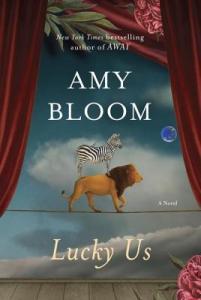 This was Riot Read #3 (September), though I read October’s first. The inside flap promised me an interesting story of America in the 1940s and of two sisters with madcap lives… or at least that was what I expected going in. I also hoped the lion and zebra on the tight rope would figure in.
This was Riot Read #3 (September), though I read October’s first. The inside flap promised me an interesting story of America in the 1940s and of two sisters with madcap lives… or at least that was what I expected going in. I also hoped the lion and zebra on the tight rope would figure in.
Title: Lucky Us
Author: Amy Bloom (cousin to Harold Bloom; US)
Genre: Literary Fiction
Characters: Iris (older sister, actress), Eva (younger sister, tarot reader, eventually), Edgar (father), Reenie (Iris’ partner), Gus (Reenie’s husband), Danny (stolen orphan), Francisco (makeup artist)
Setting: 1940s WWII: Ohio, California, New York, and Germany
Plot: “My father’s wife died. My mother said we should drive down to his place and see what might be in it for us.” And so Eva’s mother leaves her on Edgar’s doorstep, and Iris and Eva enter a partnership of sisterhood, culminating in a trip to Hollywood away from their father. Eventually Hollywood doesn’t pan out (lesbian orgies are faux paux, apparently), and when Edgar shows up, the sisters and Francisco, a benevolent gay makeup artist, pack it up and head to New York City. Edgar becomes a butler and Iris a governess, and Iris falls in love with the cook, Reenie. She falls hard enough that she reports Reenie’s husband as a German spy, and he is arrested and sent to North Dakota, where he eventually takes a one-way ticket to Germany. We learn pieces of the plot through letters from Iris and Gus, while Eva is the main narrator and the one who is an anchor through the shifting tides of love and loss.
Verdict: Of the four Riot Reads so far, I am least impressed with this one. I’m a shade more in its favor than to say I’m ambivalent, but it was not as impressive as Land of Love and Drowning or Broken Monsters. I enjoyed the historical flavors of Hollywood, New York CIty, and Germany, but I didn’t like the letters as a form of plot advancement. They enforce the separation between the sisters and the intensity of Gus’ experience, but I don’t think they were well executed and it made the transitions between chapters awkward, to me. I was also a little disappointed that there was no lion and zebra on a tight rope, but I can stretch the putty of my literary brain to see symbolism beyond the aesthetics. The brain putty can also recognize a lot of interesting commentary on racial, religious, and cultural identity, but who am I to comment on meaning?
If I had to recommend, I’d say …. yes, read it, but make it a upper mid-list pick.
